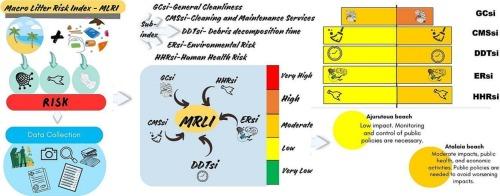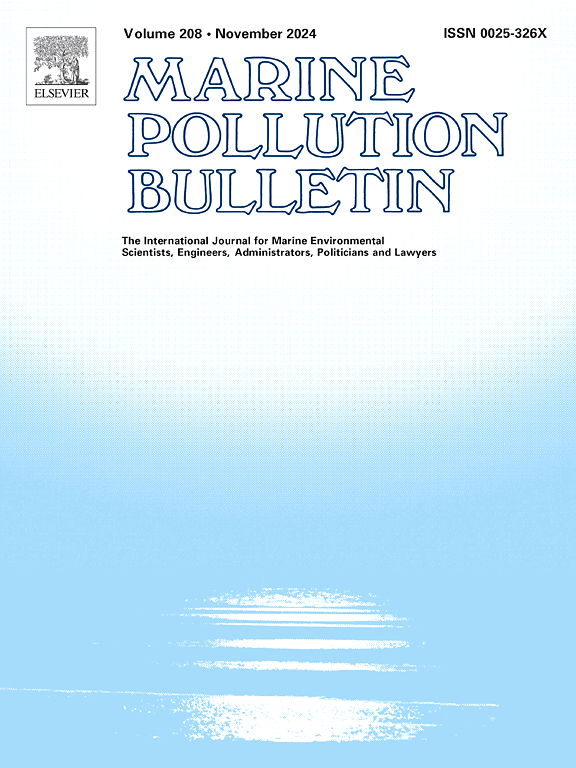Marine litter pollution on Amazonian beaches: A risk assessment study with focus on non-urban beaches
IF 4.9
3区 环境科学与生态学
Q1 ENVIRONMENTAL SCIENCES
引用次数: 0
Abstract
To better understand the impacts of marine litter, this study focused on the development and application of the Macro-Litter Risk Index-MLRI using two Amazonian beaches, rural and village beaches. This index facilitates comparisons between different beaches, offering a detailed classification of risks and contributing to impact assessment and mitigation through the formulation of appropriate public policies. The MLRI is based on five sub-indices, of which two were adapted for non urban beach settings to ensure its applicability. No weighting was assigned to the sub indices, reinforcing their equal importance in the final result. Each sub-index was rated on a scale from 1 (Very High risk) to 5 (Very Low risk), with the MLRI value calculated as the arithmetic mean of these ratings. On each beach, macro-litter was manually collected in four pre-defined areas, each measuring 400 m2. These areas were located within the intertidal zone, with their upper boundary set at the high tide line. The items were quantified and characterized according to marine litter survey and monitoring protocols. According to the MLRI, the rural beach was classified as Low risk (score 4) due to its low level of impact, while the village beach was classified as Moderate risk (score 3), indicating moderate environmental, public health, and economic impacts. The results highlight the vulnerability of each beach according to the sub-indices and emphasize the need for public policy implementation. Overall, this index can be applied to any non-urban beach worldwide, providing valuable insights to support the development of public policies.

亚马逊海滩的海洋垃圾污染:以非城市海滩为重点的风险评估研究。
为了更好地了解海洋垃圾的影响,本研究以两个亚马逊海滩,农村和村庄海滩为研究对象,重点研究了宏观垃圾风险指数- mlri的开发和应用。该指数有助于比较不同泳滩,提供详细的风险分类,并有助于通过制定适当的公共政策来评估和减轻影响。MLRI基于5个子指数,其中2个子指数适用于非城市海滩环境,以确保其适用性。各分项指标均未赋予权重,这加强了它们在最终结果中的同等重要性。每个子指数按1(非常高风险)到5(非常低风险)的等级进行评级,MLRI值作为这些评级的算术平均值计算。在每个海滩上,人工收集了四个预定义区域的大型垃圾,每个区域的面积为400平方米。这些区域位于潮间带内,其上界设于涨潮线。根据海洋垃圾调查和监测方案对这些项目进行了量化和表征。根据MLRI,由于影响程度低,农村海滩被分类为低风险(得分4),而村庄海滩被分类为中等风险(得分3),表明中等环境,公共卫生和经济影响。结果突出了各海滩的脆弱性,并强调了公共政策实施的必要性。总体而言,该指数可应用于全球任何非城市海滩,为支持公共政策的制定提供有价值的见解。
本文章由计算机程序翻译,如有差异,请以英文原文为准。
求助全文
约1分钟内获得全文
求助全文
来源期刊

Marine pollution bulletin
环境科学-海洋与淡水生物学
CiteScore
10.20
自引率
15.50%
发文量
1077
审稿时长
68 days
期刊介绍:
Marine Pollution Bulletin is concerned with the rational use of maritime and marine resources in estuaries, the seas and oceans, as well as with documenting marine pollution and introducing new forms of measurement and analysis. A wide range of topics are discussed as news, comment, reviews and research reports, not only on effluent disposal and pollution control, but also on the management, economic aspects and protection of the marine environment in general.
 求助内容:
求助内容: 应助结果提醒方式:
应助结果提醒方式:


